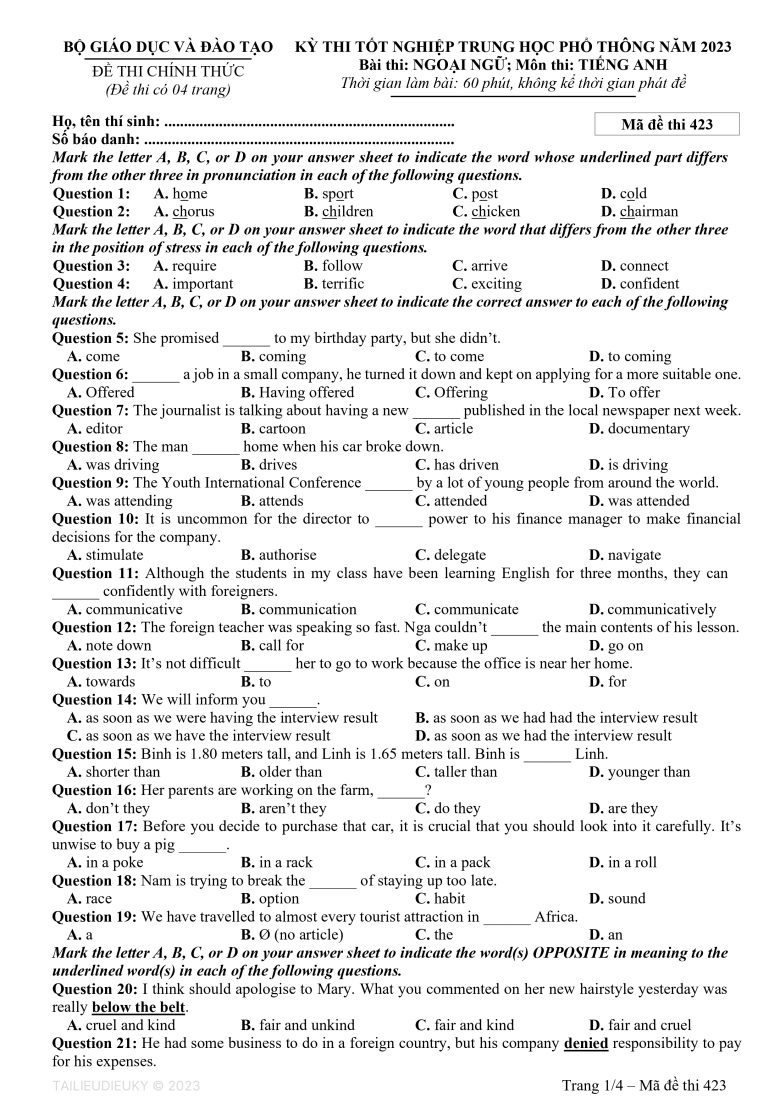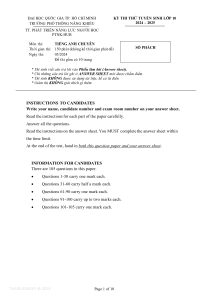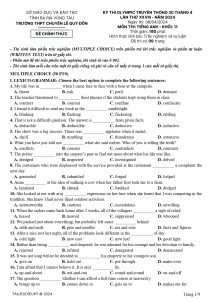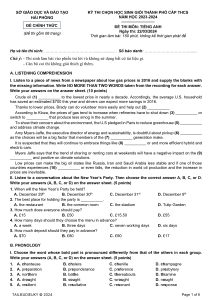Đề thi chính thức và đáp án mã đề thi 420 môn Tiếng Anh trong Kỳ thi tốt nghiệp THPT năm 2023, thuộc Bài thi Ngoại ngữ THPT Quốc gia. Tài liệu này có thể tải xuống dưới dạng file Word và PDF, cho phép in ấn và chỉnh sửa theo nhu cầu cá nhân. Đáp án chính thức môn Tiếng Anh TN THPT năm 2023 từ Bộ Giáo dục và Đào tạo đã được cập nhật đầy đủ và chính xác, để phụ huynh và thí sinh tham khảo và so sánh với bài làm của mình.
Bài thi tiếng Anh, môn cuối cùng trong kỳ thi tốt nghiệp THPT, đã được hoàn thành bởi gần một triệu thí sinh vào chiều ngày 29/6. Trong tổng số này, hơn 90% thí sinh đã chọn tiếng Anh làm bài thi Ngoại ngữ. Đáng chú ý, trước kỳ thi, gần 47.000 thí sinh đã được miễn và tính điểm 10 bài thi này do có các chứng chỉ ngoại ngữ quốc tế, tương đương từ IELTS 4.0 trở lên.
Dưới là gợi ý đáp án môn Tiếng Anh mã đề 423 trong kỳ thi tốt nghiệp THPT 2023.
Đáp án Mã đề thi 423 - Đề thi Tốt nghiệp THPT năm 2023 môn Tiếng Anh
1.B 2.A 3.B 4.D 5.C 6.A 7.C 8.A 9.D 10.C
11.C 12.A 13.D 14.C 15.C 16.B 17.A 18.C 19.B 20.C
21.A 22.A 23.B 24.B 25.B 26.D 27.C 28.D 29.C 30.A
31.A 32.B 33.C 34.B 35.A 36.A 37.B 38.A 39.B 40.A
41.C 42.B 43.B 44. B 45.A 46.C 47.C 48.C 49.A 50.A
Trích dẫn nội dung "Đề thi chính thức Kỳ thi Tốt nghiệp THPT năm 2023 môn Tiếng Anh, mã đề thi 423":
BỘ GIÁO DỤC VÀ ĐÀO TẠO
ĐỀ THI CHÍNH THỨC
(Đề thi có 04 trang)
KỲ THI TỐT NGHIỆP TRUNG HỌC PHỔ THÔNG NĂM 2023
Bài thi: NGOẠI NGỮ; Môn thi: TIẾNG ANH
Thời gian làm bài: 60 phút, không kể thời gian phát đề
Họ, tên thí sinh: ..........................................................................
Số báo danh: ...............................................................................
Mark the letter A, B, C, or D on your answer sheet to indicate the word whose underlined part differs from the other three in pronunciation in each of the following questions.
Question 1: A. home B. sport C. post D. cold
Question 2: A. chorus B. children C. chicken D. chairman
Mark the letter A, B, C, or D on your answer sheet to indicate the word that differs from the other three in the position of stress in each of the following questions.
Question 3: A. require B. follow C. arrive D. connect
Question 4: A. important B. terrific C. exciting D. confident
Mark the letter A, B, C, or D on your answer sheet to indicate the correct answer to each of the following questions.
Question 5: She promised ______ to my birthday party, but she didn’t.
A. come B. coming C. to come D. to coming
Question 6: ______ a job in a small company, he turned it down and kept on applying for a more suitable one.
A. Offered B. Having offered C. Offering D. To offer
Question 7: The journalist is talking about having a new ______ published in the local newspaper next week.
A. editor B. cartoon C. article D. documentary
Question 8: The man ______ home when his car broke down.
A. was driving B. drives C. has driven D. is driving
Question 9: The Youth International Conference ______ by a lot of young people from around the world.
A. was attending B. attends C. attended D. was attended
Question 10: It is uncommon for the director to ______ power to his finance manager to make financial decisions for the company.
A. stimulate B. authorise C. delegate D. navigate
Question 11: Although the students in my class have been learning English for three months, they can ______ confidently with foreigners.
A. communicative B. communication C. communicate D. communicatively
Question 12: The foreign teacher was speaking so fast. Nga couldn’t ______ the main contents of his lesson.
A. note down B. call for C. make up D. go on
Question 13: It’s not difficult ______ her to go to work because the office is near her home.
A. towards B. to C. on D. for
Question 14: We will inform you ______.
A. as soon as we were having the interview result B. as soon as we had had the interview result
C. as soon as we have the interview result D. as soon as we had the interview result
Question 15: Binh is 1.80 meters tall, and Linh is 1.65 meters tall. Binh is ______ Linh.
A. shorter than B. older than C. taller than D. younger than
Question 16: Her parents are working on the farm, ______?
A. don’t they B. aren’t they C. do they D. are they
Question 17: Before you decide to purchase that car, it is crucial that you should look into it carefully. It’s unwise to buy a pig ______.
A. in a poke B. in a rack C. in a pack D. in a roll
Question 18: Nam is trying to break the ______ of staying up too late.
A. race B. option C. habit D. sound
Question 19: We have travelled to almost every tourist attraction in ______ Africa.
A. a B. Ø (no article) C. the D. an
Mark the letter A, B, C, or D on your answer sheet to indicate the word(s) OPPOSITE in meaning to the underlined word(s) in each of the following questions.
Question 20: I think should apologise to Mary. What you commented on her new hairstyle yesterday was really below the belt.
A. cruel and kind B. fair and unkind C. fair and kind D. fair and cruel
Question 21: He had some business to do in a foreign country, but his company denied responsibility to pay for his expenses.
A. accepted B. neglected C. avoided D. refused
Mark the letter A, B, C, or D on your answer sheet to indicate the word CLOSEST in meaning to the underlined word in each of the following questions.
Question 22: Returning home after the earthquake, Simon saw that his house was extremely chaotic.
A. messy B. organised C. neat D. tidy
Question 23: My uncle dreams of having a new house, so he plans to save up for it.
A. quits B. intends C. moves D. leaves
Mark the letter A, B, C, or D on your answer sheet to indicate the sentence that best completes each of the following exchanges.
Question 24: Peter and Khanh are talking about learning foreign languages.
- Peter: “I think students should learn two foreign languages when they are at school.”
- Khanh: “ ______. It helps them communicate with more people and broaden their minds.”
A. I quite disagree with you B. I quite agree with you
C. That’s not a good idea D. I don’t think it’s a good idea
Question 25: Hong and Mike are in the school canteen.
- Hong: “______?”
- Mike: “Here you are.”
A. Can you play basketball B. Can you pass the salt, please
C. Can you speak Japanese, please D. Can you sit here
Read the following passage and mark the letter A, B, C, or D on your answer sheet to indicate the correct word or phrase that best fits each of the numbered blanks from 26 to 30.
Getting work experience is a good way for young people who are still at school to see whether they would enjoy a particular career. Future employers like to know about their work experience (26) ______ they think is important for them in the process of recruiting employees. And young people get the chance to consider (27) ______ possibilities for a future career with working professionals. In addition. they will find these professionals’ advice specially helpful thinking about the different choices they will have to (28) ______.
Work experience often involves uncomfortable situations, (29) ______ people who in such situations can learn how to behave appropriately in front of clients and how to respond to things in the workplace. Appearance is also important and they need to dress suitably whether they are going for a job as an engineer or an IT specialist, or a job which is perhaps less technical but equally (30) ______, such as a medical doctor or a teacher.
(Adapted from Complete First for Schools)
Question 26: A. who B. where C. when D. which
Question 27: A. one B. none C. many D. each
Question 28: A. fill B. build C. do D. make
Question 29: A. for B. either C. but D. nor
Question 30: A. demanding B. commanding C. understanding D. confusing
Read the following passage and mark the letter A, B, C, or D on your answer sheet to indicate the correct answer to each of the questions from 31 to 35.
Device-centred communication has become almost universal over the past twenty years. More than three quarters of people in the world now own a mobile device, and more than half communicate via social networking.
It is now hard to imagine a world without mobile devices consisting of such things as mobile phones, laptops and tablets. They allow us to stay in touch with a large network of friends, no matter where they are. But many experts say that communicating with a device is nothing like talking with someone in person. “Body language, eye contact and tone of voice can tell us so much,” psychologist Mary Peters says. “And none of those exist on a device. Even video chat removes many subtle clues.”
We don’t know to what extent these technologies will permanently change the way people interact. People will always want to meet up with others in small and large groups. Indeed, it is fair to say that social media makes it easier than ever before for people to organise social events. However, there is still a danger that Device-centred communication may have a negative long-term impact on the way people interact with each other on a day-to-day basis.
We must not, therefore, lose sight of the need to focus on the actual people around us, and remember that they deserve our real – not virtual – attention. The idea of a culture where people always have a screen between them sounds a bit funny, because deep understanding comes when we see the reactions on other people’s faces.
(Adapted from Solutions)
Question 31: The passage is mainly about ______.
A. the impact of device-centred communication
B. the misunderstanding of device-centred communication
C. the definition of device-centred communication
D. the development of device-centred communication
Question 32: The word They in paragraph 2 refers to ______.
A. laptops B. mobile devices C. mobile phones D. tablets
Question 33: In paragraph 2, in her statement about the advantages of communicating in person, Mary Peters mentioned all of the following EXCEPT ______.
A. tone of voice B. body language C. handshake D. eye contact
Question 34: The word meet up in paragraph 3 is closest in meaning to ______.
A. come down B. get together C. get away D. come away
Question 35: According to paragraph 4, deep understanding appears when ______.
A. we see the reactions on the faces of other people B. we interact with modern technology
C. we care about our virtual friends D. we communicate through social networking
Read the following passage and mark the letter A, B, C, or D on your answer sheet to indicate the correct answer to each of the questions from 36 to 42.
A recent survey into how teenagers in a Southeast Asian country spend their free time has come up with what some people regard as a surprising finding: many of those surveyed reported that they would rather stay at home and do things indoors than go out and experience real-life adventures. One in four teenagers surveyed believed that online experiences were as fulfilling as real life, and more than half were actually afraid of trying new experiences. When asked about their most memorable experience over the previous ten months, nearly 30% of boys said ‘playing a new video game’, while 10% of all teenagers said it was watching a new TV series. On asking for more detailed information, researchers found that 20% of boys and 22% of girls said they had never had real-life adventure.
It would be easy to blame technological advances for these findings. After all, today’s teenagers have many more indoor activities to choose from than did their parents. About half a century ago children were expected to spend more of their free time outside. But researchers do not put the blame wholly on technology.
To members of older generations, these findings are worrying, because it means that young people increasingly rely on virtual reality and are consequently missing out on real outdoor activities such as mountain climbing, kayaking, etc., which have always been regarded as both enjoyable and character-building. They surveyed adults said they thought today’s youth were more protected than they had been when they were growing up. Giving examples of this protection, more than half said they would not let their teenagers to get into a taxi on their own. It is not clear whether adults believe the world is more dangerous than it used to be or whether they do not trust today’s youngsters to look after themselves.
(Adapted from Cambridge English First for Schools)
Question 36: Which of the following can be the main idea of the passage?
A. Teenagers’ free-time activity preferences and adults’ concerns
B. Viewpoints on teenagers’ free-time adventures and online games
C. Thorough research on teenagers’ online games and outdoor activities
D. Fears and tensions encountered by teenagers and adults’ concerns
Question 37: The word fulfilling in paragraph 1 is closest in meaning to ______.
A. discouraging B. satisfying C. devastating D. frightening
Question 38: The word advances in paragraph 2 is closest in meaning to ______.
A. developments B. movements C. barriers D. advantages
Question 39: The word they in paragraph 3 refers to ______.
A. young people B. surveyed adults C. older generations D. outdoor activities
Question 40: According to paragraph 3, the older generations are worried about ______.
A. the young’s reliance on virtual reality B. the young’s lack of indoor activities
C. the young’s preferences for outdoor activities D. the young’s ignorance about virtual reality
Question 41: Which of the following is NOT TRUE according to the passage?
A. One fourth of the surveyed teenagers believed online experiences in their free time were as pleasing as real life.
B. The older generations surveyed thought that today’s teenagers were more protected than they had been.
C. The majority of teenagers surveyed enjoyed real outdoor activities in their leisure time.
D. Researchers do not put all the blame on technology for causing teenagers’ lack of real-life experiences.
Question 42: Which of the following can be inferred from the passage?
A. The majority of teenagers surveyed believed virtual reality was as interesting as the real life.
B. Many adults are doubtful about their children’s ability to take care of themselves.
C. Many adults think that the present world is as dangerous as it used to be.
D. Virtual life is considered to be more and more challenging for teenagers in the present world.
Mark the letter A, B, C, or D on your answer sheet to indicate the sentence that best combines each pair of sentences in the following questions.
Question 43: The boy band had just finished their first live performance. All the audiences at the theatre gave them a loud round of applause.
A. Not until all the audiences at the theatre gave them a loud round of applause did the boy band finish their first live performance.
B. Barely had the boy band finished their first live performance when all the audiences at the theatre gave them a loud round of applause.
C. No matter when the boy band finished their first live performance did all the audiences at the theatre give them a loud round of applause.
D. Had it not been for the boy band’s first live performance, all the audiences at the theatre would have given them a loud round of applause.
Question 44: The gold ring was expensive. I couldn’t afford to buy it.
A. If the gold ring had been cheaper, I couldn’t have afforded to buy it.
B. If the gold ring had been less expensive, I could have afforded to buy it.
C. If the gold ring had been more expensive, I could have afforded to buy it.
D. If the gold ring had been cheaper, I can’t have afforded to buy it.
Mark the letter A, B, C, or D on your answer sheet to indicate the underlined part that needs correction in each of the following questions.
Question 45: They give a good presentation on how to adopt a green lifestyle last week.
A B C D
Question 46: The man bought the old painting and then sold them to a collector at a higher price.
A B C D
Question 47: Their pioneering research showed that the learning motivation of the two groups of
A
learners quite distinctive from each other, and the comparative group whose learning motivation
B C
was stronger performed better than the control group.
D
Mark the letter A, B, C, or D on your answer sheet to indicate the sentence that is closest in meaning to each of the following questions.
Question 48: “I helped the old lady cross the road,” said the teacher.
A. The teacher said she helped the old lady cross the road.
B. The teacher said I helped the old lady cross the road.
C. The teacher said she had helped the old lady cross the road.
D. The teacher said she would help the old lady cross the road.
Question 49: Students are not allowed to bring food into the computer room.
A. Students mustn’t bring food into the computer room.
B. Students won’t bring food into the computer room.
C. Students wouldn’t bring food into the computer room.
D. Students needn’t bring food into the computer room.
Question 50: Mark started learning Spanish seven years ago.
A. Mark has learned Spanish for seven years.
B. Mark has started learning Spanish since seven years.
C. Mark started learning Spanish when he was seven years old.
D. Mark has learned Spanish since he was seven years old.
------------------------ HẾT ------------------------



